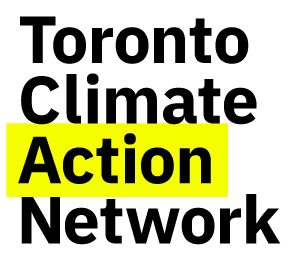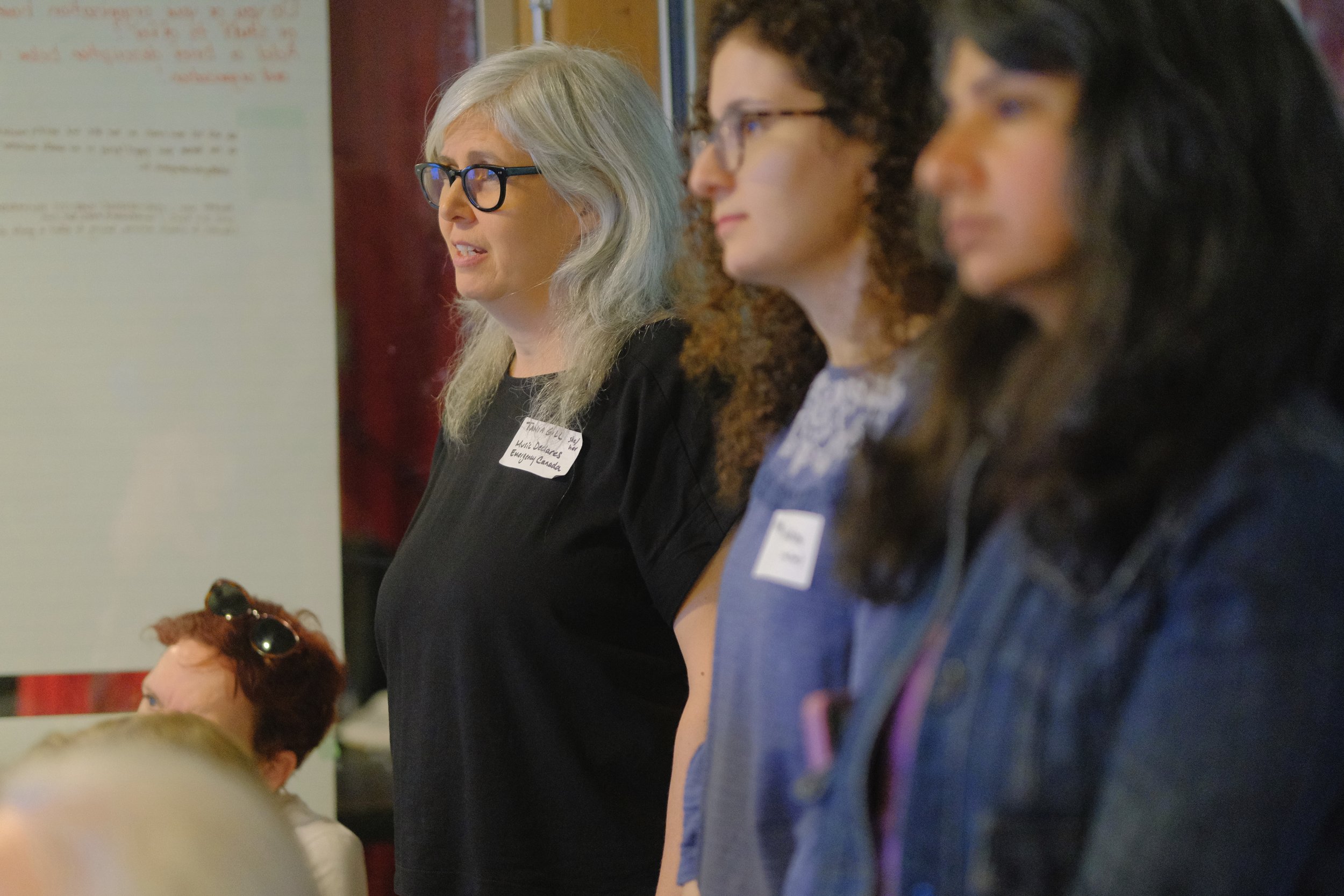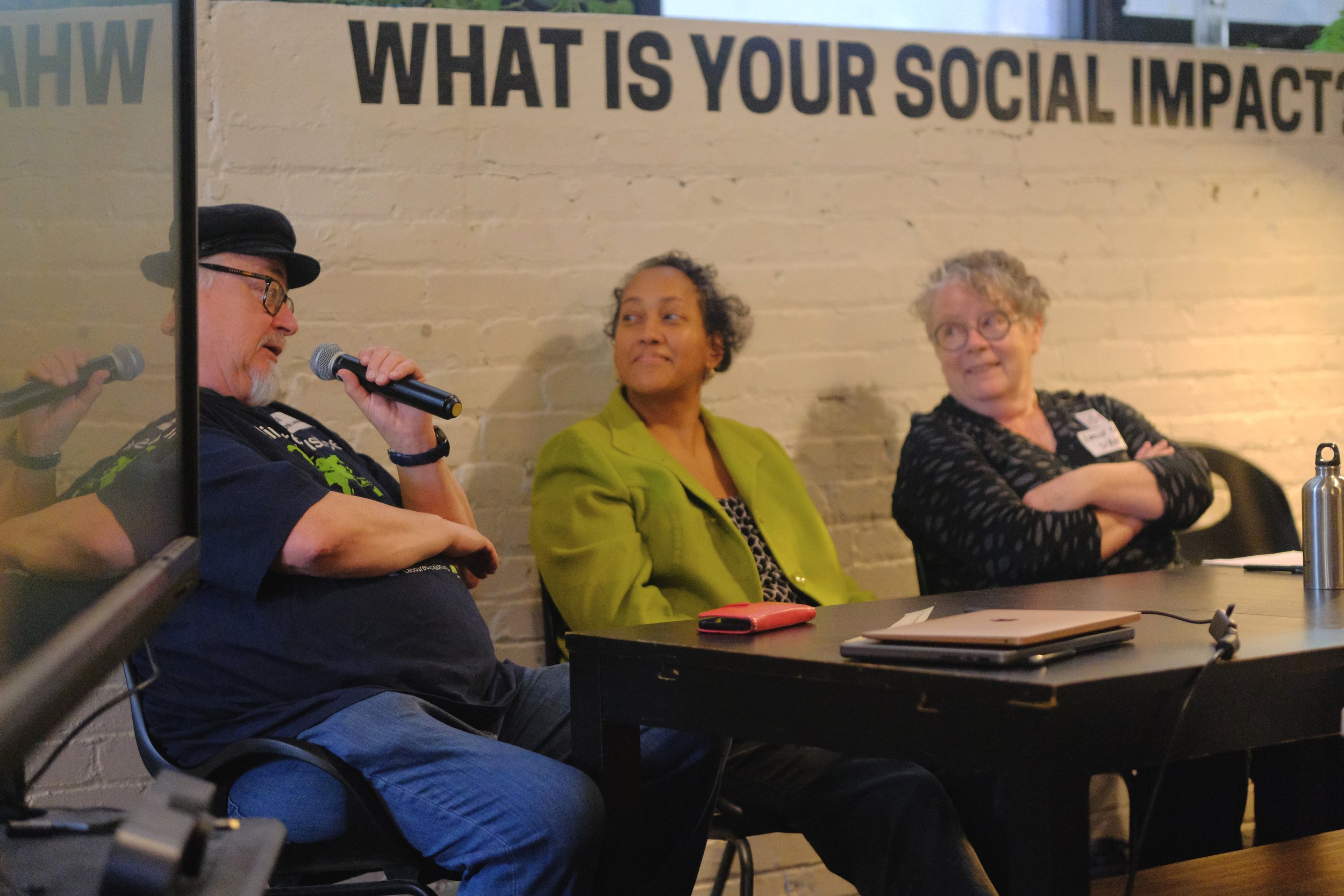TCAN 2024 Climate Action Summit Report
The goal of the TCAN Climate Action Summit was to bring Toronto climate activists together and provide an opportunity for connecting, sharing, learning, and strategizing and - judging from the feedback we received - , the Summit achieved its goal. Over one hundred registered for the event and the majority reported that they appreciated the opportunity for in-person rather than on-line conversations, learned a lot from the diversity of speakers and topics, and left energized and mobilized!
Saturday May 4th
Where are We on Climate?
The Summit kicked off on Saturday morning with a session entitled “Where We Are We On Climate.” There was no avoiding the bad news: Canada is not on track to achieve its Paris targets, our emissions are rising, not falling, and the coordinated opposition of the fossil fuel industry to climate action remains a major obstacle. But each speaker highlighted areas where we are making gains and the need to keep pushing.
- At the federal level, Allie Rougeot (Environmental Defence) spoke to the importance of communicating regularly with MPs to ensure that climate policies, such as clean electricity regulations or the cap on emissions from the oil and gas sector, are not weakened by heavy lobbying from the fossil fuel industry.
- At the provincial level, Lana Goldberg (Stand.Earth) spoke frankly about the Ontario government’s hostility to climate action and the need to work with other levels of government to blunt the force of government’s pro-gas and pro-developer policies.
- How-Sen Chong (Toronto Environmental Alliance) highlighted the ways in which municipal climate action on housing, transit, waste and energy can multi-solve for health, jobs, and affordability, while also recognizing the challenges Toronto faces from the provincial government.
- Chloe Tse (Change Course) spoke to how big banks, particularly RBC, continue to massively fund the fossil fuel industry, including projects that violate Indigenous rights, while greenwashing their operations in the eyes of the public. But by organizing actions in solidarity with Indigenous land-defenders, and mobilizing students on campuses across Turtle Island, the youth-led organization Change Course has successfully raised public awareness of the banks’ operations and challenged their greenwashing.
Mental Health for Climate Activists
At the lunchtime break, a packed meeting room listened to Dr. Nate Charach speak about mental health for climate activists, addressing the overwhelm so many of us feel, the need to recognize and accept our feelings, and the sources of collective strength from which we can all draw. This was a much-needed and appreciated session for many.
Plenary Session: Building a Better Climate Justice Movement in Toronto
On Saturday afternoon Emmay Mah from Toronto Environmental Alliance moderated a plenary session with climate activists from different groups, including Tara Seucharan (Greenpeace), Shelly Gordon (Seniors for Climate Action Now!), Anne Keary (For Our Kids Toronto), Minaz Assani (Good Futures Collective); Steve Shalhorn (Labour Education Centre) and Aniket and Abram from Climate Justice Toronto. Panelists spoke about their personal journeys into climate activism; the kinds of change they seek to effect; the strategies they employ – both inside and outside; and their visions for climate justice in Toronto. This session highlighted the diversity of climate organizing across our city from supporting community organizing, to lobbying politicians on climate policy, to actions to highlight climate injustice; to working in solidarity with tenants fighting renovictions.
Skills-Building Workshops
Summit attendees were then invited to attend one of three skills-building workshops:
Best Practices for Community Engagement with Krissan Veerasingham (Scarborough Environmental Alliance), Kumsa Baker (Toronto Community Benefits Network) and Julia Morgan (Pocket Change)
Media Training with Katrina Miller, Strategic communications and policy specialist with Canadians for Tax Fairness
How to Engage Your Councillor with Saman Tabasinejad (Progress Toronto)
These workshops provided invaluable opportunities for skills-building and knowledge-sharing. In different ways, each highlighted the importance of attention to communication. Together they also illuminated the many ways in which listening and relationship-building are foundational to organizing at all levels – from neighbourhood projects on retrofitting housing to connecting residents with local greenspaces to speaking to councillors about local needs. And, as Krissan Veerasingham pointed out, in a city as diverse and multilingual as Toronto, we need to be paying attention to communication in languages other than English as well.
Sunday May 5th
Strategy Session I: Ending Gas in Toronto
The first strategy session on Sunday was devoted to a discussion of getting Toronto off fossil gas. The provincial government’s interest in maintaining and expanding the use of fossil gas – both as a source of heating for buildings and as fuel for electric power generation - pose a grave threat to the City of Toronto’s climate action strategy. The speakers, from different organizations, discussed the strategies they are pursuing to address this.
Lana Goldberg (Stand.Earth) spoke to the need for municipal by-laws that require that new buildings be electric, a move that would significantly slow the expansion of gas infrastructure. She noted that cities in Quebec, including Montreal, and in the United States have implemented such by-laws. As a “creature of the province,” Toronto faces challenges that other cities don’t, but Stand.Earth is exploring jurisdictional pathways and encouraging advocacy on this issue.
Adrian Currie (Environmental Defence) spoke to the expansion of the Portlands Gas plant, whose use has already tripled under the Ford government, and the efforts of Environmental Defence to raise awareness of the projected health and environmental costs, particularly for new housing developments in the Portlands area, as a way of putting pressure on the government. He also addressed Bill 165 and the Ontario government’s unprecedented decision to overrule the Ontario Energy Board. Bill 165 effectively ensures that Ontarians will keep (rather than stop) subsidizing the expansion of gas infrastructure – thereby ensuring that Enbridge continues to profit. Environmental Defence is encouraging all municipalities to pass a motion in support of the OEB decision.
Dave Smith from TERRE (Toronto East Residents for Renewable Energy) provided an outline of local efforts to raise public awareness and put pressure on the provincial and municipal governments to counter the expansion of the Portlands gas plant, including media events and information sessions with a focus on the health and environmental impacts. Dave emphasized the importance of engaging and organize locally, neighbourhood by neighbourhood.
Angela Bischoff (Ontario Clean Air Alliance) highlighted the fact that Ontario lags far behind other jurisdictions in the energy transition and that wind and solar are now our cleanest and lowest cost sources of energy. Rather than expanding the use of gas plants, the Ontario Clean Air Alliance is promoting a campaign urging the Ontario government to triple the use of wind and solar, a goal that is in line with Canada’s COP 28 commitments. Angela emphasized that Toronto’s future electricity needs can be met with a combination of demand management, energy conservation, off-shore wind power, rooftop solar power (residential, institutional, industrial, commercial), and EV batteries.
Lively discussions in breakout groups followed with participants suggesting additional ways to raise awareness and make visible the environmental and health impacts of fossil gas – for instance, bringing hundreds of discarded inhalers used by asthma sufferers to Queens’ Park. There was also discussion of the need to push City Council to explore all possible means of limiting the expansion of gas and ramping up renewable energy and engage other City authorities on this issue, including Toronto Public Health and the School Boards.
Sunday Strategy Session II: Moving City Hall to get Toronto to Net Zero
The afternoon strategy session focused on how to accelerate the implementation of the TransformTO Net Zero Strategy. Toronto’s emissions are rising, not falling, and we need to get back on track.
Gaby Kalapos (Clean Air Partnership) emphasized how far we have come – most municipalities across Ontario have set plans and commitments; the challenge now is implementation. With plans to dramatically increase the building of new houses, she emphasized that we need to ensure that new buildings must be at Net-Zero and, if they’re not, require an explanation of why. Municipal climate action plans must require reports on operational savings over the long term. Gaby emphasized that we need both bottom-up pushing on Council and top-down leadership from Council to accelerate action.
Lyn Adamson (ClimateFast and City of Toronto Climate Advisory Group) pointed out that Toronto’s next short-term implementation for 2026 – 30 will be developed in 2025, and activists need to be pushing the City to be ambitious. One of the problems that Lyn highlighted is that many councillors don’t understand the strategy or its significance. To address this ClimateFast is proposing to develop dedicated resident groups in as many wards as possible, provide them with training on the City’s climate strategy and encourage them to engage with their councillors and encourage them to support the plan. Lyn also emphasized the need to lobby representatives from other levels of government across all political parties as well, highlighting the particular need for support for municipal transit.
Maggie Chang (Co-chair City of Toronto Climate Advisory Group) spoke to the work of the Climate Advisory Group and its role in engaging communities and sectors across the city. She also highlighted the fact that the City is not moving fast enough and asked attendees to provide their “Big, Bold Ideas” for accelerating the implementation of the City’s Net-Zero Strategy.
Kathryn Tait (TCAN – Collective Impact Project) spoke about the Collective Impact Project that TCAN is supporting with the goal of enabling, empowering and equipping community-led climate action. Kathryn emphasized the importance of cross-sectoral collaboration. She also spoke to the creation of an ecosystem guide for TCAN, connections with the City’s plan, and the establishment of a dedicated space, could support community hubs and climate work.
Breakout sessions followed with lively and engaged conversations all round.
Reflections and Lessons Learned
Lessons learned from the Summit were many. We learned that in-person events that bring people together from many groups are important. They get us out of our “micro-climate” bubbles and give us an opportunity to engage with the living, moving climate activist ecosystem of which we are all a part. The TCAN Summit not only brought people together; it brought together different campaigns, struggles, strategies and tactics. In this way, the event provided all participants with a view of the network of organizations, people, and relationships which constitute and energize TCAN as a whole.
The Summit made it apparent that the climate movement in Toronto and beyond is a networked movement, a movement created through connections between grassroots groups, ENGOs, research organizations, and groups focused on a broad array of issues. There is alignment and divergence and diversity. In our conversations, the use of the very term “climate action” functioned variously to refer to bringing down emissions, confronting fossil-fuelled colonial capitalism, and strengthening resilience in equity-owed communities – and more. Each of us comes into this networked movement from different positions and with different perspectives and as we chart our pathways, we learn and unlearn, we effect change and we are changed – and we continue to learn from the relationships that we enter into.
It was also clear from our conversations that Toronto’s networked climate movement is reaching out and connecting with other movements for justice– for racial justice, migrant justice, justice for Indigenous people, for workers and for Palestine. Together we are confronting structures of power - fossil fuel corporations, their political and financial enablers, and the broader political, economic, ideological systems that sustain them, including systemic racism. We are also building power - political power, community power and collective power.
The Summit gave us an opportunity to pay attention to all this and we are grateful to all who participated and provided feedback. We learned that there are areas where we need to make changes, for instance by being more intentional with regard to ensuring that White people don’t dominate conversations. And a number of participants asked about Indigenous participation: please know that this was not overlooked by the organizers and that we are committed to relationship-building through continuing to show-up in solidarity with Indigenous land and water defenders.
We hope that everyone who attended the Summit came away with new relationships, new understandings, and a renewed sense of purpose and possibility.
Thank yous
The organizers would like to thank the generous support of the Centre for Social Innovation for the use of space at CSI Spadina; Stand.Earth and the Future Ground Network for the financial support; and all the speakers, facilitators, and volunteers who gave so generously of their time and resources to make this event possible.
And thank you to Howard Wan, photographer. And to Kathryn Tait and How-Sen Chong for the last two pictures.







